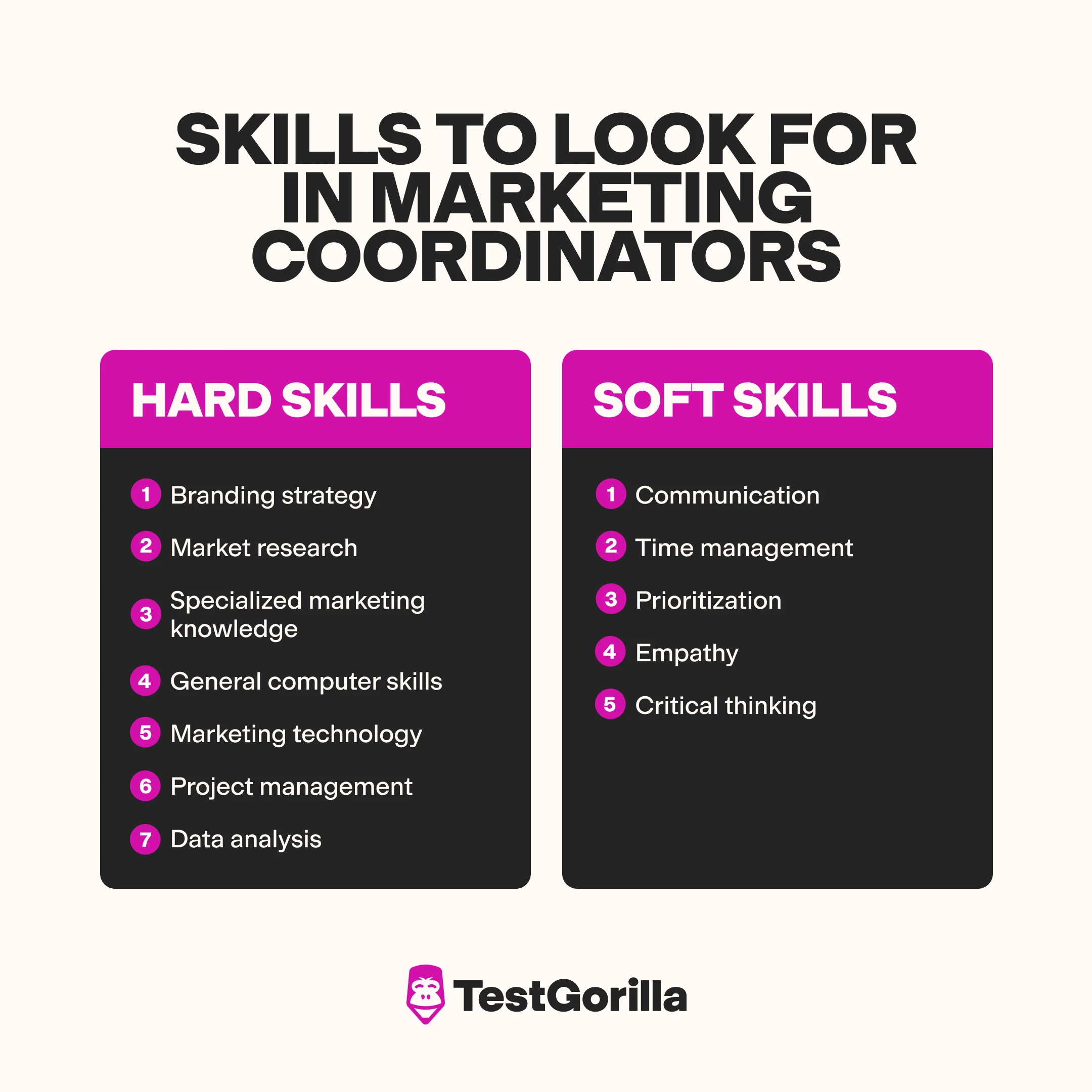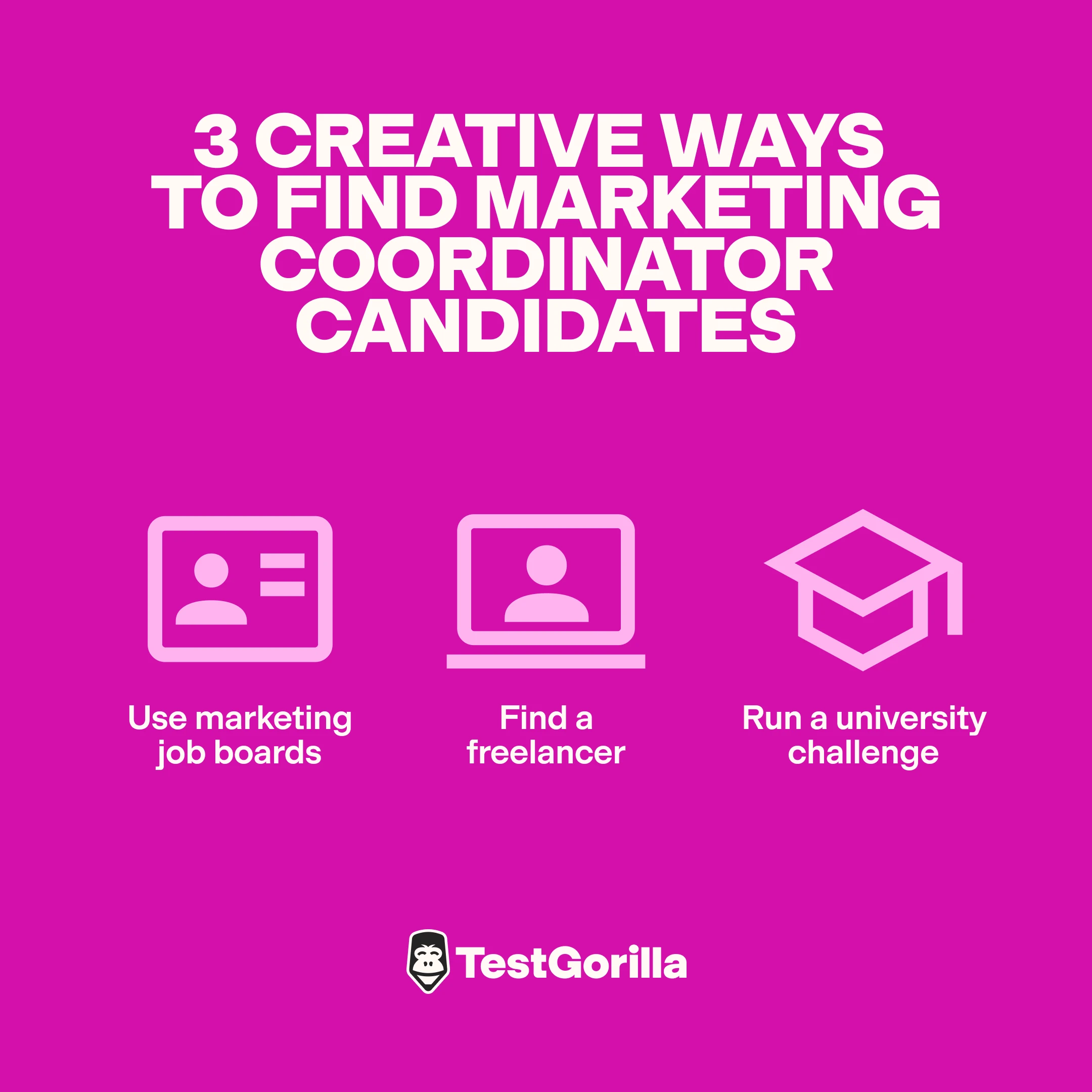Finding the perfect marketing coordinator can be stressful. After all, they’re key to running awesome campaigns, connecting with your audience, and shaping how people see your brand.
A mediocre hire might lead to missed opportunities, lackluster ads, or a failure to click with your audience. Your brand could even start to fall behind the competition!
But with our help, these worries can melt away.
In this guide, we teach you how to hire a marketing coordinator who’s spot-on for your marketing team. We cover what to know beforehand, what skills to look out for, where to find great candidates, and what not to do.
Let’s get started!
Table of contents
- What you need to know before hiring a marketing coordinator
- Skills to look for in marketing coordinators
- Where to find skilled marketing coordinators
- How to select the best marketing coordinator candidates
- Common mistakes when hiring a marketing coordinator
- Find your next marketing coordinator with TestGorilla
What you need to know before hiring a marketing coordinator
Here are several things to understand before you start looking for a marketing coordinator.
Your brand’s voice and identity
A marketing coordinator makes sure your messaging is consistent – whether that’s through social media, in emails, or on your site – strikes a chord with your audience, and communicates your values.
That’s why knowing your brand’s voice and identity is key to picking the perfect marketing coordinator. For example, is your voice more formal or laid-back? Quirky or straight-laced?
Getting clear on this helps you focus on candidates who get your vibe. Without this, you might end up hiring someone who misses the mark, making your messaging feel off-key.
Critical industry trends in your target market
Industry trends play a big role in consumer behavior. Savvy marketing coordinators know these trends inside and out, helping you seize opportunities and stay ahead of the competition.
Before you start hiring, research the industry trends impacting your business and target audience. For instance, maybe there’s a rising interest in video content in the tech industry or sustainable products in the fashion industry.
Having this insight makes it easier to spot marketing coordinators clued into what’s hot in your industry, so your campaigns will stand out for all the right reasons.
Any marketing regulations affecting your business
In many industries, marketing materials need to stick to strict regulations – including advertising standards, consumer protection guidelines set by the Fair Trade Commission, and more.
Know which regulations apply to your business so you can find a marketing coordinator who can create campaigns that are captivating and play by the rules.
Skills to look for in marketing coordinators
Now, let's chat about the skills every great marketing coordinator needs.
Hard skills
Branding strategy: Help the brand shine across all channels with the right tone and visuals.
Market research: Stay on top of customer, competitor, and industry trends.
Specialized marketing knowledge: Use know-how in areas like email marketing, social media marketing, content marketing, and paid ads.
General computer skills: Get the basics right on a Mac or PC – such as internet browsing, managing email, and using Word and Excel.
Marketing technology: Connect with audiences using customer relationship management (CRM), content management system (CMS), and social media platforms.
Project management: Keep campaigns running smoothly by managing deadlines, tasks, and team inputs.
Data analysis: Use campaign analytics to spot audience preferences and whip up improvements.
Soft skills
Communication:
Capture audiences’ imagination and collaborate effectively with team members.
Time management:
Get the job done efficiently.
Prioritization:
Is able to juggle multiple tasks and projects with ease.
Empathy:
Can put themself in others’ shoes – whether they’re colleagues or customers.
Critical thinking:
Reach conclusions and weigh up options using logic and analysis.
The best insights on HR and recruitment, delivered to your inbox.
Biweekly updates. No spam. Unsubscribe any time.
Where to find skilled marketing coordinators
Job sites like LinkedIn and Monster can get lots of eyes on your open role. However, you might want to dig deeper for folks with top marketing coordinator skills. Here are some inventive sourcing strategies to attract more targeted applications.
3 creative ways to find marketing coordinator candidates
1. Use marketing job boards that make sense for your industry/team
General marketing job boards – such as MarketingHire, the American Marketing Association, and the Society for Marketing Professional Services – are a go-to source for many employers looking for a marketing coordinator.
Want to take it up a notch? Advertise on niche job boards that are relevant to your industry, company culture, or team dynamic.
You’ll get more relevant applications this way. Plus, you can scan job-seekers’ profiles using filters like job title and company – and reach out to potential candidates yourself.
Check out:
VentureBeat for tech jobs
Jobspresso for remote jobs
Hire Digital for digital jobs
Exit Five for B2B marketing
MKT1 for start-up marketing jobs
The MarketHer for women and non-binary hires
RetirementJobs.com for hires over 50
Diversity Jobs for diversity-driven employers and candidates
2. Find a freelancer
Hiring a freelance marketing coordinator has three perks:
They’re ready-trained and can deliver key tasks ASAP.
The hiring process is much faster.
Moving on is easier when the vibe isn’t right.
Plus, you can always offer the right freelancer a full-time job.
Create an ad – and headhunt experienced marketing coordinators – on freelance sites like Upwork, Flexjobs, Guru, and Freelancing Gems. You’ll have to set the boundaries of the freelancer’s marketing project (or projects), including who they work with, what they deliver, and by when.
3. Run a university challenge
To fill graduate-level marketing coordinator roles, try running a university challenge. Partner up with a handful of colleges in your state, and then design a challenge – say, to create a marketing plan for a fictional business or shoot a three-minute video promoting a specific product.
The colleges then promote the challenge to their students. Wait for submissions to roll in, review and rank them, and then interview the top five creators!
How to select the best marketing coordinator candidates
Okay, you drafted the perfect marketing coordinator job description, published it on job sites, and now you’ve got some stellar marketing coordinator applications to sift through. What next?
Screen applicants with a tailored talent assessment
Comparing resumes and cover letters isn’t just old-school – it can also be biased, and it doesn’t allow applicants to show their skills. Instead, use talent assessments to test candidates’ marketing skills and see who tops the charts.
With TestGorilla, you can create custom marketing coordinator assessments by combining up to five tests. You can also fine-tune specific questions to match your company goals and the role’s responsibilities.
TestGorilla has a growing library of tests – 400 and counting – and each takes around 10 minutes to complete.
Here are some tests you can add to your marketing coordinator assessment:
Role-specific tests, such as those focusing on Instagram marketing, affiliate marketing, marketing analytics, email marketing, and PPC advertising.
Software knowledge tests, like those testing knowledge of Hubspot CRM, Google Analytics, and general Windows use.
Cognitive ability tests, which evaluate skills like critical thinking and verbal reasoning.
Situational judgment tests, such as those assessing communication, digital agility, and time management.
Personality tests, using models like DISC, Big 5 (OCEAN), and 16 types.
TestGorilla’s Culture Add test, which tells you how candidates’ values and behaviors match your company culture.
Hold structured interviews
In structured interviews, you ask all your candidates the same questions in the same order, then compare the quality of their responses.
To showcase the full range of candidates’ abilities, your marketing coordinator interview questions should include a mix of:
Competency questions, such as “Why is brand positioning important in cross-channel marketing activities?”
Behavioral questions, such as “Tell me about a time when you successfully coordinated multiple stakeholders to achieve targets.”
Situational questions, such as “Imagine we’re planning a social media campaign to announce a new product. Explain how and why you would set audience engagement targets.”
Technical questions, such as “How would you automate email campaigns for different customer demographics on Hubspot CRM? Walk us through the steps.”
Common mistakes when hiring a marketing coordinator
You don’t want a misstep to keep you from your ideal marketing coordinator. Here’s what to avoid.
1. Failing to assess data privacy knowledge
Your marketing team usually deals with customer data, so it’s essential marketing coordinators know their way around privacy laws like the General Data Protection Regulation (GDPR) and California Consumer Privacy Act (CCPA).
2. Emphasizing creativity over technical skills
While creativity matters, marketing coordinator roles often require highly technical skills, too. In addition to assessing candidates’ data analysis chops, don’t forget to check their user experience (UX) design and social media management skills if they’re needed for the role.
Find your next marketing coordinator with TestGorilla
Hiring the right marketing coordinator is key to making your marketing campaigns impactful and connecting with your audience. You need someone who knows the industry inside out and has creative flair with the right technical skills.
Pick a candidate who misses the mark, and your marketing budget could go down the drain due to weak brand messaging and missed market opportunities.
The good news? TestGorilla’s pre-employment assessments give you deep insights into candidates’ specialized marketing skills – as well as their critical thinking, communication skills, and more. Plus, you can measure candidates’ culture-add so you can find the perfect fit for your marketing team.
Ready to put an end to paper-thin hiring and hire only the best?
Take a pre-recorded product tour or book a live demo with our team today. Then, sign up for your free TestGorilla account!
You've scrolled this far
Why not try TestGorilla for free, and see what happens when you put skills first.




















